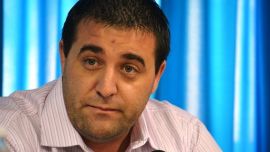Defence Minister Oscar Aguad has taken steps to investigate the Navy’s mishandling of the ARA San Juan submarine crisis and will take steps to “relieve” its chief, Admiral Marcelo Srur, government sources revealed Friday.
The government will not apply changes to the Navy’s hierarchy “until the case of the missing submarine is resolved and we know what happened”, sources told La Nación.
Aguad is reported to have long been planning an overhaul of the Armed Forces.
Sources closes to Aguad have expressed frustration over a
communication break-down between the Navy and the Defence Ministry.
Aguad claims to have learned of the possible explosion that affected the
submarine the day of its disappearance via news media.
However with pressure also mounting on the minister and his inner circle, the move to renovate the hierarchy of the Navy may have taken on greater urgency.
Opposition lawmaker Araceli Ferreyra (PPV-Movimiento Evita) is leading calls for Aguad to testify before Congress and for a special committee to conduct a full investigation into the crisis.
“I feel cheated”
Family members of the 44 missing officers reacted with outrage at the Navy’s announcement on Thursday confirming that an unusual noise heard in the Atlantic near the last known position of a missing submarine appeared to be an explosion.
“An anomalous, singular, short, violent and non-nuclear event consistent with an explosion,” occurred shortly after the last communication of the San Juan and its 44 crew, Navy spokesman Captain Enrique Balbi told a press conference in Buenos Aires.
“I feel cheated,” said Itati Leguizamon, whose husband German Suarez was a sonar operator on the ARA San Juan.
“They did not tell us they died. But they tell us they are three thousand meters (9,800 feet) deep,” added Leguizamon as other family members shouted angrily around her.
“They lied to us,” said Leguizamon, a lawyer.
A sobbing Jessica Gopar, whose husband was an electrician aboard the San Juan, said “they just told us that the submarine exploded.”
She spoke as she came out from the sub's base.
“He was the love of my life, engaged seven years before we got married,” Gopar said of her husband, Fernando Santilli. “And how can I tell my son that he no longer has a father?”
Balbi said the search will continue until there is full certainty about the fate of the ARA San Juan, but expectations that the crew-members will be found alive now seem to be all but extinguished.
“According to this report, there was an explosion,” Balbi told reporters. “We don't know what caused an explosion of these characteristics at this site on this date.”
US and specialist agencies said the “hydro-acoustic anomaly” was produced just hours after the Navy lost contact with the submarine on November 15.
The information was passed on by Rafael Grossi, Argentina’s ambassador to Austria and representative to the International Atomic Energy Agency (IAEA).
“The ambassador is also a member of a nuclear test control organisation that has a network to detect nuclear tests,” Balbi confirmed at the press conference.
Speaking to Radio Mitre, Grossi seemed to indicate that the report had come from the Comprehensive Nuclear-Test-Ban Treaty Organisation (CTBTO), an organisation that detects nuclear testing.
“They made a report which I conveyed to Chancellor [Jorge] Faurie and [Defence Minister Oscar] Aguad in which it said that a phenomenon was detected three hours after the last communication [from the ship.”
“The technical conclusion is that it was a singular event of high intensity and that it was not consistent with [normal] marine noises or earthquakes,” he added, saying it was similar to “other underwater explosions” that had been registered in the past.
Russia joins in
Argentina is leading an air-and-sea search to try to still find the sub. It is getting help from several countries now including Brazil, Britain, Chile, Colombia, France, Germany, Peru, Russia, the United States and Uruguay.
Russia was the latest navy to volunteer help, sending an oceanographic research ship as the operation shifted from rescue to recovery.
The Russian defense ministry said the Yantar was steaming to the area from the western coast of Africa on the orders of President Vladimir Putin.
The weeklong search has focused on the sub's last known position, around 200 miles off the Argentine coast, but has been hampered by bad weather.
Putin offered “words of support over the situation with the San Juan submarine” in a phone call to Argentine President Mauricio Macri late Wednesday, the Kremlin said.
Russia said the Yantar “is equipped with two deep water submersibles which allow exploratory searches at a depth of up to 6,000 meters."
US President Donald Trump offered his support, tweeting: “May God be with them and the people of Argentina!”
-TIMES/AFP


























Comments